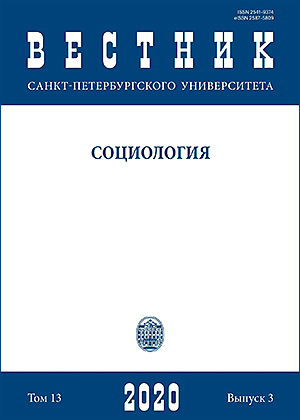Toward building an integral model of social development
DOI:
https://doi.org/10.21638/spbu12.2020.301Abstract
The article focuses on developing and clarifying the main concepts that would form the basis of an integral model of social development. Previous models (Bell, Toffler) were developed in the second half of the last century and now have lost the ability to correctly describe and explain modern social trends and tendencies. This fact, as well as the growing criticism of the idea of social development in post-industrial societies, sets the task for sociologists to develop a relevant theoretical and methodological foundation for studying modern society. The purpose of this work is to develop a conceptual scheme that would be adequate to current ideas about the social structure and forms of social interaction, and which would also form the basis of an integral model of social development. The analysis of previous models illustrated their integrative potential, which, nevertheless, should be clarified. An emergent level of analysis,
coupled with the principles of integralism, made it possible to develop a theoretical scheme of the process of reproduction of structure and action that complements the existing ones (Giddens, Archer) and makes it possible to avoid the limitations of empirical uncertainty of structure and action. The emergent state of social form is considered to have a spatiotemporal reference, which allows an empirical fixation of its characteristics. In addition, the author proposes
the concept of abstract and individual rationality when an individual is considered as an independent actor, who does not always follow mutual norms. The concepts developed in the article are meant to further development of integralism in general and integral modeling in sociology in particular.
Keywords:
integralism, social development, model-building, theory
Downloads
References
References
Downloads
Published
How to Cite
Issue
Section
License
Articles of "Vestnik of Saint Petersburg University. Sociology" are open access distributed under the terms of the License Agreement with Saint Petersburg State University, which permits to the authors unrestricted distribution and self-archiving free of charge.




